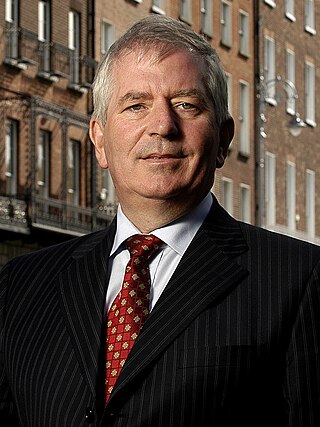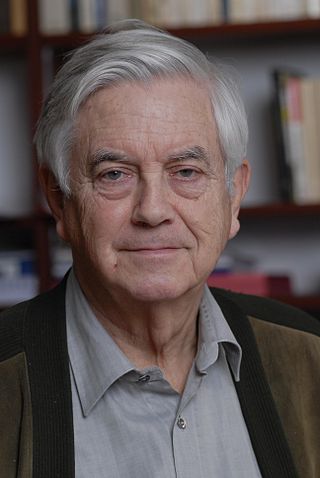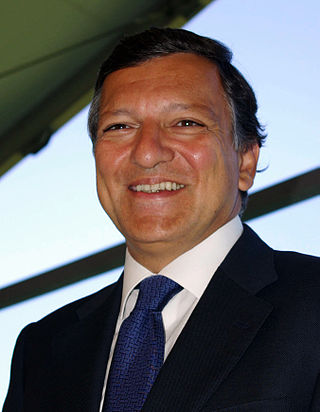
Charles McCreevy is an Irish former Fianna Fáil politician who served as European Commissioner for Internal Market and Services from 2004 to 2010, Minister for Finance from 1997 to 2004, Minister for Tourism and Trade from 1993 to 1994 and Minister for Social Welfare from 1992 to 1993. He served as a Teachta Dála (TD) for the Kildare constituency from 1977 to 2004.

Paul van Buitenen is a retired Dutch politician of the Europe Transparent Party who served as a Member of the European Parliament from 2004 to 2009.

Frederik "Frits" Bolkestein is a Dutch retired politician and energy executive who served as Leader of the People's Party for Freedom and Democracy (VVD) from 1990 to 1998 and European Commissioner for Internal Market from 1999 until 2004 under Romano Prodi.

Viviane Adélaïde Reding is a Luxembourgish politician and a former Member of the European Parliament (MEP) from Luxembourg. She is a member of the Christian Social People's Party, part of the European People's Party. She previously served as European Commissioner for Education and Culture from 1999 to 2004, European Commissioner for Information Society and Media from 2004 to 2010 and European Commissioner for Justice, Fundamental Rights and Citizenship from 2010 to 2014.

The Barroso Commission was the European Commission in office from 22 November 2004 until 31 October 2014. Its president was José Durão Barroso, who presided over 27 other commissioners. On 16 September 2009 Barroso was re-elected by the European Parliament for a further five years and his Commission was approved to take office on 9 February 2010.

The Prodi Commission was the European Commission in office between 1999 and 2004. The administration was led by former Italian Prime Minister Romano Prodi.

The Bolkestein directive or Services Directive, officially Services in the Internal Market Directive2006/123/EC, is a European Union law aiming at establishing a single market for services within the European Union (EU). Drafted under the leadership of the former right-wing European Commissioner for Internal Market Frits Bolkestein, it has been popularly referred to by his name. It was seen as an important kick-start to the Lisbon Agenda which, launched in 2000, was an agreed strategy to make the EU "the world's most dynamic and competitive economy" by 2010.
The draft European Patent Litigation Agreement (EPLA), or formally the Draft Agreement on the establishment of a European patent litigation system, was a proposed patent law agreement aimed at creating an "optional protocol to the European Patent Convention (EPC) which would commit its signatory states to an integrated judicial system, including uniform rules of procedure and a common appeal court". It differed from the Unified Patent Court Agreement in that the EPLA negotiations were coordinated from the side of the European Patent Office, rather than from the European Council and Commission and therefore also offered the possibility for non-EU states to participate.

Markets in Financial Instruments Directive 2014, is a directive of the European Union (EU). Together with Regulation No 600/2014 it provides a legal framework for securities markets, investment intermediaries, in addition to trading venues. The directive provides harmonised regulation for investment services of the member states of the European Economic Area — the EU member states plus Iceland, Norway and Liechtenstein. Its main objectives are to increase competition and investor protection, as well as level the playing field for market participants in investment services. It repeals Directive 2004/39/EC.
Home state regulation is a principle in the law of the European Union for resolving conflict of laws between Member States when dealing with cross-border selling or marketing of goods and services. The principle states that, where an action or service is performed in one country but received in another, the applicable law is the law of the country where the action or service is performed. It is also called home country control, country of origin rule, or country of origin principle. It is one possible rule of EU law, specifically of European Single Market law, that determines which laws will apply to goods or services that cross the border of Member States.
The Commissioner for Environment, Oceans and Fisheries is a member of the European Commission. The current Commissioner is Virginijus Sinkevičius, who also serves as EU Commissioner for the Environment.
The Commissioner for Industry and Entrepreneurship was a vice-president of the European Commission.
The Revised Payment Services Directive (PSD2, Directive (EU) 2015/2366, which replaced the Payment Services Directive (PSD), Directive 2007/64/EC) is an EU Directive, administered by the European Commission (Directorate General Internal Market) to regulate payment services and payment service providers throughout the European Union (EU) and European Economic Area (EEA). The PSD's purpose was to increase pan-European competition and participation in the payments industry also from non-banks, and to provide for a level playing field by harmonizing consumer protection and the rights and obligations of payment providers and users. The key objectives of the PSD2 directive are creating a more integrated European payments market, making payments more secure and protecting consumers.
The Single European Railway Directive 2012 is an EU Directive that regulates railway networks in European Union law. This recast the First Railway Directive" and consolidates legislation from each of the first to the fourth "Package" from 1991 to 2016, and allows open access operations on railway lines by companies other than those that own the rail infrastructure. The legislation was extended by further directives to include cross border transit of freight.

The Body of European Regulators for Electronic Communications (BEREC) is the body in which the regulators of the telecommunications markets in the European Union work together. Other participants include representatives of the European Commission, as well as telecommunication regulators from the member states of the EEA and of states that are in the process of joining the EU.

Sir Julian Beresford King is a British diplomat and civil servant who served as the final British European Commissioner from 2016 to 2019 prior to Brexit, having previously served as the British ambassador to Ireland (2009–2011) and France (2016).

The area of freedom, security and justice (AFSJ) of the European Union (EU) is a policy domain concerning home affairs and migration, justice as well as fundamental rights, developed to address the challenges posed to internal security by collateral effects of the free movement of people and goods in the absence of border controls or customs inspection throughout the Schengen Area, as well as to safeguard adherence to the common European values through ensuring that the fundamental rights of people are respected across the EU.
Market surveillance for products ensures that products on the market conform to applicable laws and regulations. This helps to foster trust among consumers buying products or financial services and protects consumers and professionals from harm from non-compliant products. It also helps companies that comply to stay in business and avoid losing market share to rogue traders.

The Directorate-General for Defence Industry and Space is a department of the European Commission.























